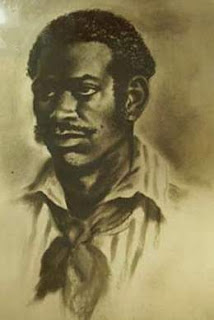 |
| Ilustración de Michel Blazquez |
In the heart of Cuba's historical
tapestry, there lies a mythic thread, delicately woven and laden with
intrigue—an assertion that the war for independence was an imperative, an
inescapable crucible that shaped the nation's destiny. Yet, beneath this
narrative, there exists a subtle choreography, a manipulation of history's
dance, orchestrating Cuba's genesis as a revolutionary entity.
This hermeneutic manipulation,
veiled in the guise of necessity, proves to be a formidable labyrinth,
resisting the correction of distortions it engenders. It resides within the
foundational myth, serving as both architect and arbiter of reality's formal
determinations, enshrouding them within the mantle of culture.
Firstly, it is imperative to
acknowledge that the independence process in Cuba may not have been necessary
at all. Instead, it emerged from the frustration of annexationist ambitions
harbored by the landowning bourgeoisie. Their vision of incorporating their
domain into the commercial sphere was thwarted following the American Civil
War, wherein their aspirations shifted from the fledgling American republic to
the Confederate states. The latter, with their imperial designs, promised an
economic prosperity previously denied to this landowning class due to Spain's
monopolistic trade policies.

It should be noted that, prior to
the British occupation in the West, Cuba's economy was primarily
service-oriented, reliant on the military budget (known as "situado")
from Mexico, which served as the colonial headquarters for the Indies. The
Spanish presence in the region was further complicated by the ongoing process
of independence on the South American continent. These movements, stemming from
the Napoleonic era, added pressure to the already militarized nature of the
colony.
The contradiction was, therefore,
largely circumstantial, driven by Spain's logistical inability to yield to the
autonomist pressures. The colony was gradually transforming into a militaristic
society, entailing political rigidity. However, popular will was not inherently
inclined towards independence; it was a population largely accommodated within
the framework of their situado-dependent economy, especially in the wake of
Western development following the British occupation. This development injected
capitalist elements into the region's economy.
This is why independence
struggled to find a foothold and resorted to scorched-earth strategies in the
invasion of the West. Even this, however, failed to decisively defeat the
Spanish army, which still had significant popular support. Hence, the recurring
necessity for American intervention, a course of action laden with
complications for the country's status—not as a contradiction but as an
imposition of the desire for independence upon a largely indifferent
population.

It is this anthropologically
fragile concept of independence in Cuba, both historically and as a
contemporary construct, that compels the myth of historical necessity. This
myth bolsters itself as an ideology, filling the void left by practicality. The
absence of this quasi-religious hermeneutic lens would result in political
instability within the republic, a condition that persisted until its
reorganization under Fidel Castro's Fidelismo and his "Cien Años de
Lucha" (One Hundred Years of Struggle). Castro artfully appropriated the
established myth of José Martí, effectively galvanizing it as the cornerstone
of his generation's ideology.
This is what imbued the 1895 war
with necessity, akin to the resurrection of Jesus in Christianity. It upheld
the revolution's cosmology, analogous to the transcendental nature of the
Christian solution. This shift represented Martí's pivotal change, unifying the
independence conflict into an ideology that had been previously foreign to the
landowning Creole annexationists. It now served as the foundation for the
country's political vision.
However, as an ideology, this
paradigm lacks practical significance, rendering its solutions as formal —similar
to the Christian faith— carrying its pseudo-religious nature in its ideological
core. More critically, this manipulation wasn't orchestrated by a pragmatic
dictator but an idealist, who subordinated the country's economic structure to
this transcendental function, ultimately leading to its destruction.
This is the crux that necessitates
correction, a task that proves arduous due to the absence of hermeneutic
resources. All projections become subservient to the initial distortion of the independence,
cloaked in its transcendental aura. This elucidates the recurrent failure of
political opposition in Cuba, which fails to develop a pragmatic approach,
always returning to the transcendental nature of the foundational myth,
embodied in Martí's legacy.
Therefore, it is the concept of
independence itself that assumes this transcendent role, derived from the
Martí-inspired Cuban identity. To effect change, it is imperative to address
this, recognizing it as an event in history, potentially flawed and undoubtedly
unnecessary. This wouldn't restore the original state but would allow for a redetermination
of the current one, grounded in pragmatism —a formidable challenge given the
aforementioned dearth of hermeneutic resources and the supposed original
necessity.



































